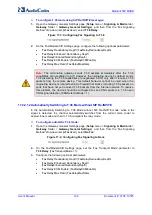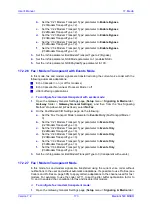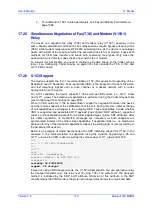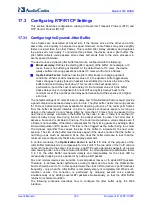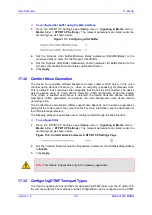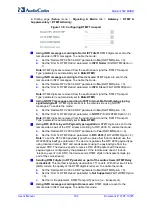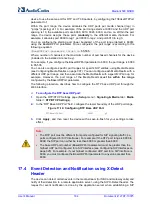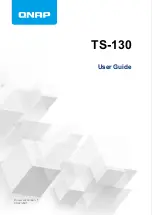
User's Manual
180
Document #: LTRT-10375
Mediant 500 MSBR
17.3 Configuring RTP/RTCP Settings
This section describes configuration relating to Real-Time Transport Protocol (RTP) and
RTP Control Protocol (RTCP).
17.3.1 Configuring the Dynamic Jitter Buffer
Voice frames are transmitted at a fixed rate. If the frames arrive at the other end at the
same rate, voice quality is perceived as good. However, some frames may arrive slightly
faster or slower than the other frames. This is called jitter (delay variation) and degrades
the perceived voice quality. To minimize this problem, the device uses a jitter buffer. The
jitter buffer collects voice packets, stores them and sends them to the voice processor in
evenly spaced intervals.
The device uses a dynamic jitter buffer that can be configured with the following:
Minimum delay:
Defines the starting jitter capacity of the buffer. For example, at 0
msec, there is no buffering at the start. At the default level of 10 msec, the device
always buffers incoming packets by at least 10 msec worth of voice frames.
Optimization Factor:
Defines how the jitter buffer tracks to changing network
conditions. When set at its maximum value of 12, the dynamic buffer aggressively
tracks changes in delay (based on packet loss statistics) to increase the size of the
buffer and doesn’t decay back down. This results in the best packet error
performance, but at the cost of extra delay. At the minimum value of 0, the buffer
tracks delays only to compensate for clock drift and quickly decays back to the
minimum level. This optimizes the delay performance but at the expense of a higher
error rate.
The default settings of 10 msec Minimum delay and 10 Optimization Factor should provide
a good compromise between delay and error rate. The jitter buffer ‘holds’ incoming packets
for 10 msec before making them available for decoding into voice. The coder polls frames
from the buffer at regular intervals in order to produce continuous speech. As long as
delays in the network do not change (jitter) by more than 10 msec from one packet to the
next, there is always a sample in the buffer for the coder to use. If there is more than 10
msec of delay at any time during the call, the packet arrives too late. The coder tries to
access a frame and is not able to find one. The coder must produce a voice sample even if
a frame is not available. It therefore compensates for the missing packet by adding a Bad-
Frame-Interpolation (BFI) packet. This loss is then flagged as the buffer being too small.
The dynamic algorithm then causes the size of the buffer to increase for the next voice
session. The size of the buffer may decrease again if the device notices that the buffer is
not filling up as much as expected. At no time does the buffer decrease to less than the
minimum size configured by the Minimum delay parameter.
In certain scenarios, the
Optimization Factor is set to 13
: One of the purposes of the
Jitter Buffer mechanism is to compensate for clock drift. If the two sides of the VoIP call are
not synchronized to the same clock source, one RTP source generates packets at a lower
rate, causing under-runs at the remote Jitter Buffer. In normal operation (optimization factor
0 to 12), the Jitter Buffer mechanism detects and compensates for the clock drift by
occasionally dropping a voice packet or by adding a BFI packet.
Fax and modem devices are sensitive to small packet losses or to added BFI packets.
Therefore, to achieve better performance during modem and fax calls, the Optimization
Factor should be set to 13. In this special mode the clock drift correction is performed less
frequently - only when the Jitter Buffer is completely empty or completely full. When such
condition occurs, the correction is performed by dropping several voice packets
simultaneously or by adding several BFI packets simultaneously, so that the Jitter Buffer
returns to its normal condition.
The following procedure describes how to configure the jitter buffer using the Web
interface.
Summary of Contents for Mediant 500 MSBR
Page 2: ......
Page 33: ...Part I Getting Started with Initial Connectivity ...
Page 34: ......
Page 36: ...User s Manual 36 Document LTRT 10375 Mediant 500 MSBR This page is intentionally left blank ...
Page 40: ...User s Manual 40 Document LTRT 10375 Mediant 500 MSBR This page is intentionally left blank ...
Page 45: ...Part II Management Tools ...
Page 46: ......
Page 48: ...User s Manual 48 Document LTRT 10375 Mediant 500 MSBR This page is intentionally left blank ...
Page 115: ...Part III General System Settings ...
Page 116: ......
Page 132: ...User s Manual 132 Document LTRT 10375 Mediant 500 MSBR This page is intentionally left blank ...
Page 137: ...Part IV General VoIP Configuration ...
Page 138: ......
Page 290: ...User s Manual 290 Document LTRT 10375 Mediant 500 MSBR This page is intentionally left blank ...
Page 306: ...User s Manual 306 Document LTRT 10375 Mediant 500 MSBR This page is intentionally left blank ...
Page 380: ...User s Manual 380 Document LTRT 10375 Mediant 500 MSBR This page is intentionally left blank ...
Page 454: ...User s Manual 454 Document LTRT 10375 Mediant 500 MSBR This page is intentionallty left blank ...
Page 455: ...Part V Gateway Application ...
Page 456: ......
Page 460: ...User s Manual 460 Document LTRT 10375 Mediant 500 MSBR This page is intentionally left blank ...
Page 484: ...User s Manual 484 Document LTRT 10375 Mediant 500 MSBR This page is intentionally left blank ...
Page 494: ...User s Manual 494 Document LTRT 10375 Mediant 500 MSBR This page is intentionally left blank ...
Page 625: ...Part VI Session Border Controller Application ...
Page 626: ......
Page 654: ...User s Manual 654 Document LTRT 10375 Mediant 500 MSBR This page is intentionally left blank ...
Page 656: ...User s Manual 656 Document LTRT 10375 Mediant 500 MSBR This page is intentionally left blank ...
Page 741: ...Part VII Cloud Resilience Package ...
Page 742: ......
Page 751: ...Part VIII Data Router Configuration ...
Page 752: ......
Page 753: ......
Page 754: ......
Page 756: ...User s Manual 756 Document LTRT 10375 Mediant 500 MSBR This page is intentionally left blank ...
Page 757: ...Part IX Maintenance ...
Page 758: ......
Page 834: ...User s Manual 834 Document LTRT 10375 Mediant 500 MSBR This page is intetnionaly left blank ...
Page 837: ...Part X Status Performance Monitoring and Reporting ...
Page 838: ......
Page 848: ...User s Manual 848 Document LTRT 10375 Mediant 500 MSBR This page is intentionally left blank ...
Page 852: ...User s Manual 852 Document LTRT 10375 Mediant 500 MSBR This page is intentionally left blank ...
Page 854: ...User s Manual 854 Document LTRT 10375 Mediant 500 MSBR This page is intentionally left blank ...
Page 878: ...User s Manual 878 Document LTRT 10375 Mediant 500 MSBR This page is intentionally left blank ...
Page 880: ...User s Manual 880 Document LTRT 10375 Mediant 500 MSBR This page is intentionally left blank ...
Page 926: ...User s Manual 926 Document LTRT 10375 Mediant 500 MSBR This page is intentionally left blank ...
Page 927: ...Part XI Diagnostics ...
Page 928: ......
Page 950: ...User s Manual 950 Document LTRT 10375 Mediant 500 MSBR This page is intentionally left blank ...
Page 954: ...User s Manual 954 Document LTRT 10375 Mediant 500 MSBR This page is intentionally left blank ...
Page 956: ...User s Manual 956 Document LTRT 10375 Mediant 500 MSBR This page is intentionally left blank ...
Page 958: ...User s Manual 958 Document LTRT 10375 Mediant 500 MSBR This page is intentionally left blank ...
Page 974: ...User s Manual 974 Document LTRT 10375 Mediant 500 MSBR This page is intentionally left blank ...
Page 976: ...User s Manual 976 Document LTRT 10375 Mediant 500 MSBR This page is intentionally left blank ...
Page 977: ...Part XII Appendix ...
Page 978: ......
Page 982: ...User s Manual 982 Document LTRT 10375 Mediant 500 MSBR This page is intentionally left blank ...



